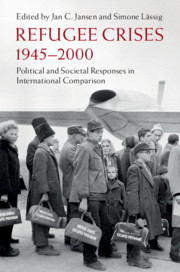Book contents
- Refugee Crises, 1945–2000
- Publications of the German Historical Institute
- Refugee Crises, 1945–2000
- Copyright page
- Contents
- Contributors
- Acknowledgments
- 1 Responses to Refugee Crises in International Comparison
- Part I The Postwar and Decolonization Moment
- Part II Refugee Movements during the Cold War and beyond
- 7 The 1956–1957 Hungarian Refugee Crisis and the Role of the Canadian Press in Opening the Doors to Asylum Seekers
- 8 Responding to and Resettling the Vietnamese Boat People
- 9 US State and Civil Society Responses to Salvadoran Refugees, 1980–1991
- 10 The Plight of the First Post–Cold War Refugees
- 11 Rwandan Refugees in Tanzania, 1994–1996
- Part III Afterword
- Index
9 - US State and Civil Society Responses to Salvadoran Refugees, 1980–1991
from Part II - Refugee Movements during the Cold War and beyond
Published online by Cambridge University Press: 13 October 2023
- Refugee Crises, 1945–2000
- Publications of the German Historical Institute
- Refugee Crises, 1945–2000
- Copyright page
- Contents
- Contributors
- Acknowledgments
- 1 Responses to Refugee Crises in International Comparison
- Part I The Postwar and Decolonization Moment
- Part II Refugee Movements during the Cold War and beyond
- 7 The 1956–1957 Hungarian Refugee Crisis and the Role of the Canadian Press in Opening the Doors to Asylum Seekers
- 8 Responding to and Resettling the Vietnamese Boat People
- 9 US State and Civil Society Responses to Salvadoran Refugees, 1980–1991
- 10 The Plight of the First Post–Cold War Refugees
- 11 Rwandan Refugees in Tanzania, 1994–1996
- Part III Afterword
- Index
Summary
This essay places the narrative of Salvadoran migration to the United States within the broader context of Reagan-era anti-Communism, US immigration and border restrictions, and civil society. It first assesses the varied reasons for Salvadoran migration to the United States during the 1980s and the Reagan administration’s response. It then examines responses by civil society, focusing on the role of social service and grassroots advocacy organizations in both challenging the US government’s Cold War narrative and aiding in the social, economic, and cultural integration of refugees. This essay draws upon case studies from the metropolitan Washington, DC, area, home to the third-largest Salvadoran population in the world. Ultimately, it argues that the Reagan administration’s refusal to grant asylum status to Salvadoran immigrants in the 1980s both galvanized civil society in the United States in support of the refugees and severely retarded the ability of Salvadorans to gain social acceptance and political legitimacy in their new country.
- Type
- Chapter
- Information
- Refugee Crises, 1945-2000Political and Societal Responses in International Comparison, pp. 209 - 234Publisher: Cambridge University PressPrint publication year: 2020



